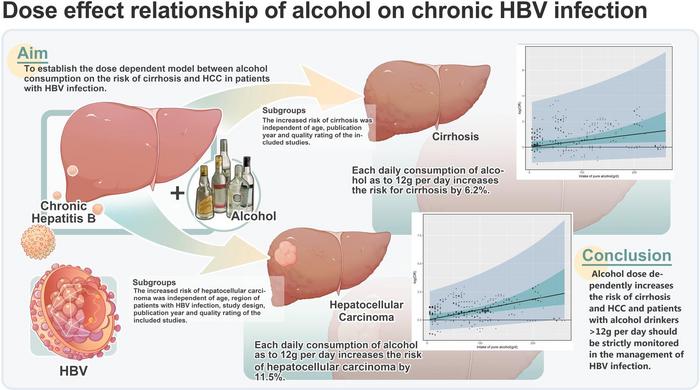
The Alarming Links Between Alcohol Consumption and Hepatitis B Virus-Related Dangers
In a groundbreaking study published in the Journal of Clinical and Translational Hepatology, researchers have unveiled critical insights into the relationship between alcohol consumption and two severe outcomes for patients with hepatitis B virus (HBV) infection: cirrhosis and hepatocellular carcinoma (HCC). This analysis sets a new precedent for understanding the extent of alcohol’s impact on liver disease within this specific population, emphasizing the need for a reassessment of monitoring protocols and treatment strategies.
The study’s introduction highlights a significant gap in existing knowledge regarding how varying levels of alcohol intake correlate with the risks of liver complications in HBV patients. Previous research notably overlooked this aspect, leaving a crucial question unanswered: Does the amount of alcohol consumed directly influence the risk of developing serious liver conditions among those infected with HBV? This query prompted the current meta-analysis, which analyzed data from extensive databases, including PubMed and Embase, and included findings from various studies, all published up until mid-May 2024.
To frame their investigation, researchers employed a random-effects model to collate data, establishing a foundational dose-dependent analysis that quantifies alcohol’s health repercussions. By focusing on both cirrhosis and HCC, the study aimed to deliver compelling evidence that could change clinical recommendations around alcohol consumption for individuals diagnosed with chronic HBV infection. After reviewing 45 studies with a total of 33,272 patients, the researchers provided a startling revelation regarding the impact of habitual alcohol intake.
The results showed that patients who engaged in drinking displayed a strikingly elevated risk of developing cirrhosis and HCC compared to non-drinkers. The analysis found an overall pooled odds ratio (OR) of 2.61 for cirrhosis and 2.27 for HCC among drinkers, suggesting that the hazards associated with alcohol intake are more pronounced in this vulnerable population. Furthermore, the study delves deeper by comparing low-level to high-level drinkers, unearthing an estimated pooled odds ratio of 2.34 for cirrhosis and 2.42 for HCC, underscoring a substantial risk increase attributable to greater alcohol consumption.
The highlight of the study lies in its quantitative analysis, where a linear dose-dependent relationship was identified. It revealed that each daily intake of 12 grams of alcohol correlates with an increment in the risk of cirrhosis by an alarming 6.2% and an increase in the risk of HCC by 11.5%. This pivotal finding indicates that even minimal alcohol consumption can considerably affect liver health in those already compromised by HBV, suggesting a pressing need for healthcare providers to advise patients accordingly.
Drawing from these findings, the researchers advocate for enhanced monitoring of HBV patients who consume alcohol. They propose that medical practitioners implement stricter guidelines regarding alcohol intake and its implications for liver health, especially in light of the studied risks. While the data paints a grim picture, it simultaneously offers an opportunity to reevaluate treatment strategies, empower patient education, and potentially mitigate the negative health consequences associated with HBV infection.
The implications of this research extend beyond clinical recommendations, resonating with public health messaging around alcohol consumption. It accentuates the urgency of developing comprehensive approaches that inform patients about the dangers of alcohol, particularly for those battling viral hepatitis. The results call upon health authorities to tailor public campaigns that raise awareness of liver health and the interconnected role of alcohol consumption, ultimately aiming to shift societal norms surrounding drinking habits.
Interestingly, the researchers note that these associations are not mere statistical correlations; they reflect biological realities that connect alcohol metabolism with liver pathology. Chronic alcohol consumption is known to impose additional stress on liver function, leading to an exacerbation of pre-existing liver conditions. This underscores how lifestyle choices can profoundly shape healthcare outcomes, particularly for individuals already predisposed to liver diseases like cirrhosis and HCC due to HBV.
As this study marks an important step forward in hepatology, it prompts further investigation into the biological mechanisms underlying the interactions between alcohol and HBV infection. Going forward, researchers must delve into understanding how these dynamics operate at a cellular level and how they can inform preventive strategies or therapeutic interventions. Such research could extend the findings of this analysis and unveil novel therapeutic pathways that could better serve patients’ needs.
While the study shines a light on the risks of alcohol consumption, it also embodies a call to action for multidisciplinary collaboration among healthcare professionals. Hepatologists, oncologists, and primary care physicians need to work together to identify at-risk patients and address their unique needs concerning alcohol consumption. This collective effort could enhance clinical outcomes and ultimately improve the quality of life for those living with HBV.
In conclusion, this research brings a stark and urgent message to the forefront of medical discourse: alcohol consumption poses significant risks for patients with HBV. Recognizing the potential for severe health outcomes should serve as a catalyst for both clinical practices and public health strategies. As healthcare practitioners absorb the implications of this study, it becomes essential to foster a greater awareness of the importance of responsible alcohol consumption, particularly in vulnerable populations.
With the ongoing evolution of our understanding of liver disease and the impact of lifestyle factors, the nexus between alcohol and viral hepatitis stands as an area ripe for future research and intervention. Therefore, as we reflect on this significant study, we are reminded of the broader obligations we hold in protecting public health and advancing the conversation around the crucial intersection of alcohol, viral infections, and liver disease.
Subject of Research: Alcohol Consumption and Its Impact on HBV-Associated Risks
Article Title: Dose-dependent Relationship between Alcohol Consumption and the Risks of Hepatitis B Virus-associated Cirrhosis and Hepatocellular Carcinoma: A Meta-analysis and Systematic Review
News Publication Date: 17-Dec-2024
Web References: https://www.xiahepublishing.com/journal/jcth
References: DOI: 10.14218/JCTH.2024.00379
Image Credits: Yu-Chen Fan, Ming-Hua Zheng, Yin-Ping Wu
Keywords: Alcohol consumption, hepatitis B virus, cirrhosis, hepatocellular carcinoma, public health, liver disease, clinical research, meta-analysis, risks.





